非谓语动词用法讲解
英语语法非谓语动词讲解超全超实用
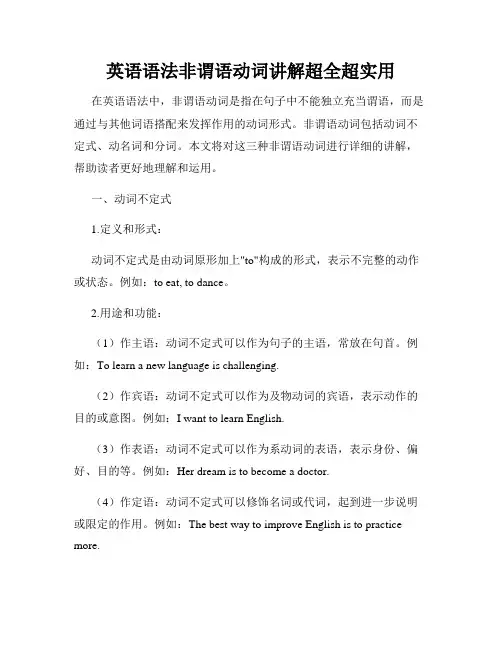
英语语法非谓语动词讲解超全超实用在英语语法中,非谓语动词是指在句子中不能独立充当谓语,而是通过与其他词语搭配来发挥作用的动词形式。
非谓语动词包括动词不定式、动名词和分词。
本文将对这三种非谓语动词进行详细的讲解,帮助读者更好地理解和运用。
一、动词不定式1.定义和形式:动词不定式是由动词原形加上"to"构成的形式,表示不完整的动作或状态。
例如:to eat, to dance。
2.用途和功能:(1)作主语:动词不定式可以作为句子的主语,常放在句首。
例如:To learn a new language is challenging.(2)作宾语:动词不定式可以作为及物动词的宾语,表示动作的目的或意图。
例如:I want to learn English.(3)作表语:动词不定式可以作为系动词的表语,表示身份、偏好、目的等。
例如:Her dream is to become a doctor.(4)作定语:动词不定式可以修饰名词或代词,起到进一步说明或限定的作用。
例如:The best way to improve English is to practice more.(5)作状语:动词不定式可以表示时间、目的、方式等状语的作用。
例如:I went to the park to relax.3.特殊用法:(1)省略to:在某些情况下,不定式的to可以省略,例如在助动词let、make、help等后面。
例如:Let me go.(2)动词不定式的时态:动词不定式没有人称和数的变化,但可以根据不同的时间来使用不同的时态。
例如:I want to go shopping.(现在时态)I wanted to go shopping.(过去时态)二、动名词1.定义和形式:动名词是由动词加上-ing构成的形式,可以作为名词使用。
例如:swimming, running。
2.用途和功能:(1)作主语:动名词可以作为句子的主语,常放在句首。
非谓语动词用法讲解
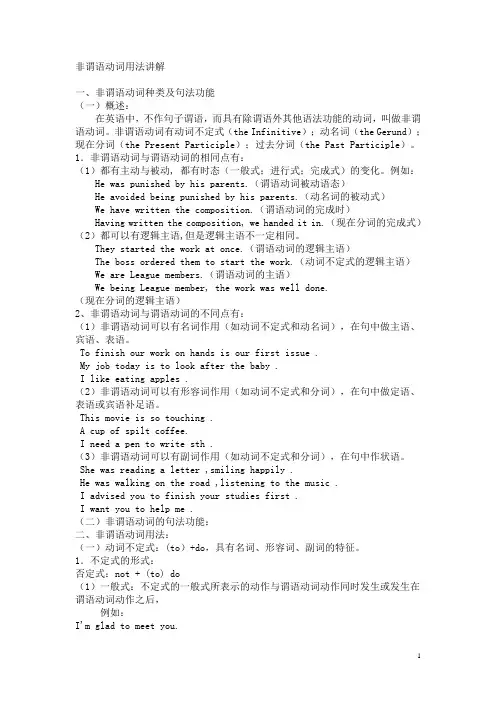
非谓语动词用法讲解一、非谓语动词种类及句法功能(一)概述:在英语中,不作句子谓语,而具有除谓语外其他语法功能的动词,叫做非谓语动词。
非谓语动词有动词不定式(the Infinitive);动名词(the Gerund);现在分词(the Present Participle);过去分词(the Past Participle)。
1.非谓语动词与谓语动词的相同点有:(1)都有主动与被动, 都有时态(一般式;进行式;完成式)的变化。
例如:He was punished by his parents.(谓语动词被动语态)He avoided being punished by his parents.(动名词的被动式)We have written the composition.(谓语动词的完成时)Having written the composition, we handed it in.(现在分词的完成式)(2)都可以有逻辑主语,但是逻辑主语不一定相同。
They started the work at once.(谓语动词的逻辑主语)The boss ordered them to start the work.(动词不定式的逻辑主语)We are League members.(谓语动词的主语)We being League member, the work was well done.(现在分词的逻辑主语)2、非谓语动词与谓语动词的不同点有:(1)非谓语动词可以有名词作用(如动词不定式和动名词),在句中做主语、宾语、表语。
To finish our work on hands is our first issue .My job today is to look after the baby .I like eating apples .(2)非谓语动词可以有形容词作用(如动词不定式和分词),在句中做定语、表语或宾语补足语。
非谓语动词用法详解

非谓语动词用法详解动词的非谓语形式有三种:不定式、动名词和分词(一)不定式不定式由“to十动词原形”构成,其否定形式是“not to do”.不定式可以带宾语或状语构成不定式短语,没有人称和数的变化,但有时态和语态的变化.不定式可作主语、宾语、状语、表语和定语,但不能单独作谓语.不定式的逻辑主语有时用“for十名词或代词宾格”构成.1.不定式的用法:l)作主语.不定式短语作主语时,往往放在谓语之后,用it作形式主语.例如:To see is to believe.It is right to give up smoking.2)作宾语.不定式短语作宾语时,如果还带有宾语补足语。
往往把不定式宾语放在宾语补足语之后,而用it作形式宾语.例如:He wanted to go.I find it interesting to study work with him.3)作宾语补足语.例如:He asked me to do the work with him.注意:在feel,hear,listen to,look at,notice, observe,see,watch,have, let,make等词后的补足语中,不定式不带to.但是这些句子如果变成被动结构时,就必须带to.例如I often hear him sing the song.He is often heard to sing the song.注意:不定式动词在介词but,except,besides后面时,如果这些介词之前有行为动词do的各种形式,那么,这些介词后的不定式不带to,否则要带to.如:She could do nothing but cry.What do you like to do besides swim?I have no choice but to go.动词help之后,带to或不带to都可以。
Will you please help me (to) take this suitcase? 请你帮我提一下这个衣箱好吗?She often helps her mother (to) clean their house. 她经常帮助她妈妈打扫房子。
用法讲解非谓语动词
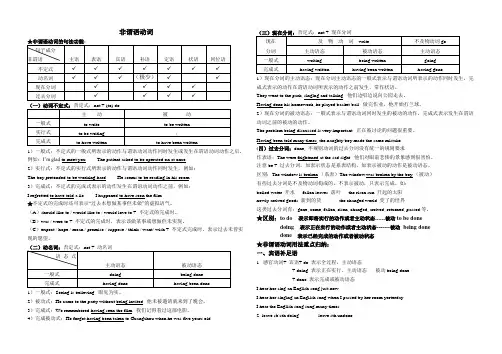
非谓语动词1)一般式:不定式的一般式所表示的动作与谓语动词动作同时发生或发生在谓语动词动作之后,例如:I’m glad to meet you. The patient asked to be operated on at once.2)实行式:不定式的实行式所表示的动作与谓语动词动作同时发生,例如:The boy pretended to be working hard. He seems to be reading in his room.3)完成式:不定式的完成式表示的动作发生在谓语动词动作之前,例如:I regretted to have told a lie. I happened to have seen the film.★不定式的完成时还可表示“过去本想做某事但未做”的虚拟语气。
(A)should like to / would like to / would love to + 不定式的完成时。
(B)was / were to + 不定式的完成时,表示该做某事或想做但未实现。
(C)expect / hope / mean / promise / suppose / think / want/ wish + 不定式完成时,表示过去未曾实现的愿望。
1)一般式:Seeing is believing. 眼见为实。
2)被动式:He came to the party without being invited. 他未被邀请就来到了晚会。
3)完成式:We remembered having seen the film. 我们记得看过这部电影。
4)完成被动式:He forgot having been taken to Guangzhou when he was five years old.1)现在分词的主动语态:现在分词主动语态的一般式表示与谓语动词所表示的动作同时发生,完成式表示的动作在谓语动词所表示的动作之前发生,常作状语。
非谓语动词的三种形式及用法讲解
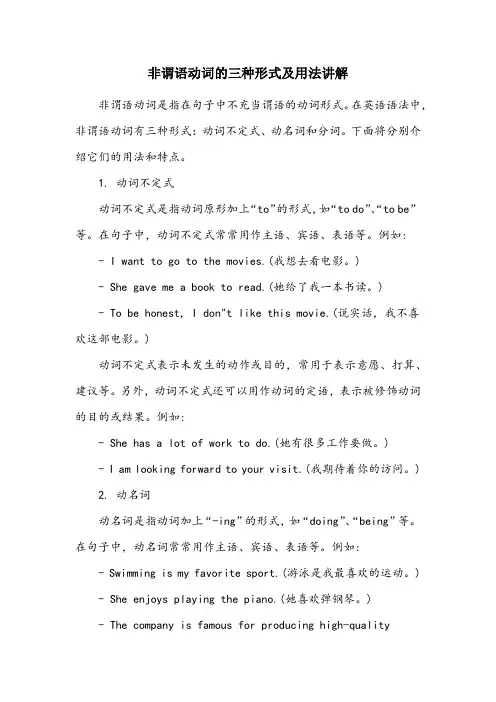
非谓语动词的三种形式及用法讲解非谓语动词是指在句子中不充当谓语的动词形式。
在英语语法中,非谓语动词有三种形式:动词不定式、动名词和分词。
下面将分别介绍它们的用法和特点。
1. 动词不定式动词不定式是指动词原形加上“to”的形式,如“to do”、“to be”等。
在句子中,动词不定式常常用作主语、宾语、表语等。
例如:- I want to go to the movies.(我想去看电影。
)- She gave me a book to read.(她给了我一本书读。
)- To be honest, I don"t like this movie.(说实话,我不喜欢这部电影。
)动词不定式表示未发生的动作或目的,常用于表示意愿、打算、建议等。
另外,动词不定式还可以用作动词的定语,表示被修饰动词的目的或结果。
例如:- She has a lot of work to do.(她有很多工作要做。
)- I am looking forward to your visit.(我期待着你的访问。
)2. 动名词动名词是指动词加上“-ing”的形式,如“doing”、“being”等。
在句子中,动名词常常用作主语、宾语、表语等。
例如:- Swimming is my favorite sport.(游泳是我最喜欢的运动。
) - She enjoys playing the piano.(她喜欢弹钢琴。
)- The company is famous for producing high-qualityproducts.(这家公司以生产高质量的产品而闻名。
)动名词表示正在进行的动作或状态,常用于表示爱好、兴趣、能力等。
另外,动名词还可以用作动词的定语,表示被修饰动词的方式或伴随状况。
例如:- I am feeling very tired.(我感觉很累。
)- She was excited about learning a new language.(她对学习一门新语言感到兴奋。
非谓语动词讲解有逗号
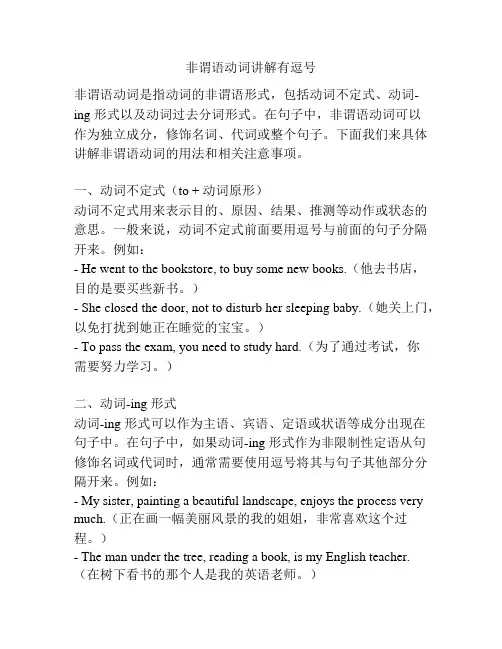
非谓语动词讲解有逗号非谓语动词是指动词的非谓语形式,包括动词不定式、动词-ing 形式以及动词过去分词形式。
在句子中,非谓语动词可以作为独立成分,修饰名词、代词或整个句子。
下面我们来具体讲解非谓语动词的用法和相关注意事项。
一、动词不定式(to + 动词原形)动词不定式用来表示目的、原因、结果、推测等动作或状态的意思。
一般来说,动词不定式前面要用逗号与前面的句子分隔开来。
例如:- He went to the bookstore, to buy some new books.(他去书店,目的是要买些新书。
)- She closed the door, not to disturb her sleeping baby.(她关上门,以免打扰到她正在睡觉的宝宝。
)- To pass the exam, you need to study hard.(为了通过考试,你需要努力学习。
)二、动词-ing 形式动词-ing 形式可以作为主语、宾语、定语或状语等成分出现在句子中。
在句子中,如果动词-ing 形式作为非限制性定语从句修饰名词或代词时,通常需要使用逗号将其与句子其他部分分隔开来。
例如:- My sister, painting a beautiful landscape, enjoys the process very much.(正在画一幅美丽风景的我的姐姐,非常喜欢这个过程。
)- The man under the tree, reading a book, is my English teacher.(在树下看书的那个人是我的英语老师。
)三、动词过去分词形式动词过去分词形式作为非谓语动词,通常用来表示被动、完成与否等意义。
在句子中,如果动词过去分词形式作为非限制性定语从句修饰名词或代词时,也通常需要使用逗号将其与句子其他部分分隔开来。
例如:- The old house, destroyed during the war, was never rebuilt.(在战争期间被摧毁的那座老房子从未重新建立。
非谓语动词的用法详解
非谓语动词非谓语动词有3种:不定式,动名词和分词。
不定式不定式由“to do”构成,其否定式“not to do”。
不定式可带宾语或状语构成不定式短语,没有人称和数的变化,但有语态的变化,不定式可作主,宾,定,状,补,表,不能单独作谓语。
一. 不定式的用法1 作主语To see is to believe.It is right to give up smoking.2 作表语My job is to teach English.3 作宾语He wanted to go.I find it hard to work with him.常见用不定式作宾语的动词:want, wish, like, decide, help, ask, agree, afford, arrange, care, determine, fail, guarantee, hesitate, hope, hurry, manage, offer, pretend, promise, seek, prepare, refuse, swear, expec t, plan, would like, make up one’s mind, be determined4 作补语He asked me to open the door.常见用不定式作宾补的动词:advise, allow, permit, forbid, ask, beg, encourage, expect, force, get, invite, like, order, peruade, prefer, require, teach, tell, want, warn, wish, considerpractice:* 在感官动词feel, hear, listen to, see, look, notice, watch, observe,和使役动词make, let, have等后的补语中,不定式不带to,但这些句子变成被动结构时,就必须带toI often hear him sing the song.He is often heard to sing the song.5 作定语He is looking for a room to live in.There’s nothing to worry about.不定式作定语的用法:6 作状语I came here to see you. (表目的) in order to / so as toWe were excited to hear the news. (表原因)He hurried to the school (only) to find nobody there.(表结果7 疑问词+不定式,在句中起名词作用,可作主,宾,表He didn’t know what to say.How to solve the problem is very important.My question is when to start.8 作插入语To tell the truth, I don’t agree with you.to be sure to be frank to sum up to begin /start withto make matters worse to be brief二不定式的时态,语态1 一般式:表示的动作与谓语动作同时或在它之后发生He pretended not to know me when I met him in the street.2 进行式:表示动作发生时,不定式动作正在发生He pretended to be reading English when I entered the classroom.3 完成式:表示动作发生在谓语动作之前He is said to have learned English in Britain for a year.A railway is said to be being built now.No harm seems to have been done.四不定式的省略为避免重复可用to来代替前面的不定式,常出现在下列动词后expect, hope, wish, mean, prefer, care, forget, want, try 或出现在be glad, be happy, would like/love后eg: I haven’t been to Hong Kong, but I wish to.--- Would you come to the party?--- I’d love to, but…如果在省略不定式中含有be, have, have been 等系动词或助动词,这些词要保留。
非谓语动词的种类及用法讲解
非谓语动词的种类及用法讲解非谓语动词是指不具备人称和数的特征,不受时态和语态的限制,并且不能独立充当句子的谓语成分的动词形式。
它们可以用作主语、定语、状语、宾语等,起到丰富句子结构和表达方式的作用。
非谓语动词包括动词不定式、动名词和分词(现在分词和过去分词)。
本文将对这几种非谓语动词的种类及用法进行详细的讲解。
一、动词不定式动词不定式是动词的一种非谓语形式,一般由“to + 动词原形”构成。
它具有虚拟性,不受人称和数的限制,常用作句子的主语、宾语、表语、定语和状语等。
下面分别来讲解它们的用法。
1. 作主语To learn a foreign language is beneficial to personal development.(学习一门外语对个人发展有益。
)2. 作宾语I want to buy a new car.(我想买一辆新车。
)3. 作表语Her dream is to become a doctor.(她的梦想是成为一名医生。
)4. 作定语I have a book to read.(我有一本书要读。
)5. 作状语He went to the library to study.(他去图书馆学习。
)二、动名词动名词是动词的一种非谓语形式,一般由动词的-ing形式构成。
它可以作主语、宾语、表语、定语和状语等,但不能用作动词的宾补。
下面逐一介绍它们的用法。
1. 作主语Swimming is good exercise.(游泳是一项好运动。
)2. 作宾语I enjoy reading novels.(我喜欢读小说。
)3. 作表语His hobby is playing basketball.(他的爱好是打篮球。
)4. 作定语She bought a running shoe.(她买了一双跑步鞋。
)5. 作状语He broke his leg while skiing.(他在滑雪时摔断了腿。
非谓语动词的六大用法
非谓语动词的六大用法在句中起名词、形容词或副词的作用,充当句子主语、宾语、表语、宾语补足语、定语和状语而不能起谓语作用的动词,是动词的非谓语形式,又叫作非谓语动词。
非谓语动词有动词不定式(to do)、动词-ing形式和过去分词(done)。
一、动词不定式和动词-ing形式作主语1.不定式作主语表示具体的某次动作,特别是将来动作;动词的-ing形式作主语表示经常性、习惯性动作或已经发生的动作。
To remember these words today is our main task. 今天记住这些单词是我们的主要任务。
Walking is a good form of exercise for both young and old . 散步对年轻人和老年人都是很好的运形式。
Suffering is the most powerful teacher of life.苦难是人生最伟大的老师。
Being laughed at in the public made him angry. 在公共场所被嘲笑使他很生气。
2.不定式和动词的-ing形式作主语的常用句型1) 不定式作主语的句型①It is +形容词(名词) to doIt is better to be safe than sorry. 事后追悔不如事前稳妥。
It is easy to open a shop but hard to keep it always open. 开设店铺易,维持常开难。
It is necessary to complete the design before National Day.在国庆节前完成设计是必要的。
It is very important to follow the rules.遵守规则是非常重要的。
It’s a waste of time to do that. 干那件事是浪费时间。
It is a great art to laugh at your own misfortune. 对己之不幸付之一笑,这是一门伟大的艺术。
非谓语动词讲解(超全
非谓语动词讲解(超全非谓语动词是指动词的非谓语形式,包括动词不定式、动名词和现在分词。
与主谓结构不同,非谓语动词可在句子中作状语、定语或表语。
在英语中,非谓语动词的形式是相对固定的,但在不同的语法环境中所表示的意义和用法有所差异。
1. 动词不定式(to-infinitive)动词不定式由“to + 动词原形”构成,常常用作动词的宾语、主语、状语或定语。
例如:- 宾语:I want to go to the zoo.(我想去动物园。
)- 主语:To speak English fluently is important for your career.(流利地说英语对你的事业很重要。
)- 状语:He went to the store to buy some groceries.(他去商店买了些杂货。
)- 定语:She needs a pen to write her essay.(她需要一支笔来写作文。
)2. 动名词(gerund)动名词是将动词加上-ing构成,常常用作动词的宾语、主语、状语或定语。
例如:- 宾语:I enjoy reading books in my spare time.(我闲暇时喜欢读书。
)- 主语:Swimming is good exercise.(游泳是很好的锻炼。
)- 状语:She left the party early, feeling tired.(她因为感觉累了,所以提前离开了聚会。
)- 定语:The crying baby woke up the whole neighborhood.(哭闹的婴儿把整个邻居都吵醒了。
)3. 现在分词(present participle)现在分词由动词原形加上-ing构成,常常用作动词的宾语、主语、状语或定语。
例如:- 宾语:He enjoys playing soccer on weekends.(他喜欢周末踢足球。
)- 主语:Listening to music helps me relax.(听音乐帮助我放松。
- 1、下载文档前请自行甄别文档内容的完整性,平台不提供额外的编辑、内容补充、找答案等附加服务。
- 2、"仅部分预览"的文档,不可在线预览部分如存在完整性等问题,可反馈申请退款(可完整预览的文档不适用该条件!)。
- 3、如文档侵犯您的权益,请联系客服反馈,我们会尽快为您处理(人工客服工作时间:9:00-18:30)。
非谓语动词讲解
1. 动词不定式
(1)动词不定式的构成:
不定式的基本形式为:to+动词原形,有时可以不用to,这里的to是不定式符号,本身无词义,动词不定式的否定形式是not+(to+)动词原形。
(2)动词不定式的句法功能:
1)不定式作主语
动词不定式作主语时,常用it作形式主语,而将真正的主语放在句末,其结构为:It + be + adj. +(for/of sb.)+动词不定式。
如:
To learn English well is useful.→It is useful to learn English well.
学好英语很有用。
It’s important for us to protect the environment.
保护环境对我们来说很重要。
注意:在kind,good,nice,clever等表示人的品质的形容词后,不用for而用of。
如:
It’s very kind of you to help me.你帮助我真是太好啦。
It’s very clever of you to do like that.你那样做真是太聪明啦!
2)不定式作宾语
①一些谓语动词后只能用不定式作宾语,常见的这类词是表示命令、打算或希望的,如:would like,like,want,wish,hope,decide,plan,expect等。
如:Would you like to see a film this evening?
你今晚想去看电影吗?
②在find,think后跟不定式作宾语时,常用it代替,而将真正的宾语放在句末。
如:I find it easy to read English every day.我发现每天读英语很容易。
③常见的一些不带to的动词不定式
why not do...,why don’t you do...,had better(not) do...,would rather do,could/would/will you please(not) do...
如:I would rather stay in the room.我宁愿待在房间里。
3)不定式作宾语补足语
不定式作宾语补足语时与宾语有逻辑上的主谓关系。
如:tell,ask,want,allow,get,would like,encourage 后常跟动词不定式作宾语补足语。
如:Lucy asked him to turn down the radio.露西让他关小收音机。
My mother encourages me to learn Japanese.我妈妈鼓励我学日语。
注意:
还有一些使役动词和感官动词也用不定式作宾补,这时不定式要省略to。
这些动词有:一感(feel)、二听(hear,listen to)、三让(let,make,have)、四看(look at,see,watch,notice),但变被动语态时,必须加上to。
如:My friends were made to work the whole night by the boss.
老板让我的朋友们工作了一整夜。
4)不定式作定语。
